This guide shows how to deal with the black screen problem while playing games on Windows PC. This issue can occur on any game that you play on your Windows 11/10 device. According to the feedback given by some affected users, some games show a black screen on startup or while loading, whereas, in some games, the screen goes black after a few minutes of launching the game. When the screen goes black, the game does not stop or crash, the users can hear the sound of their games but cannot see anything on the screen. In this article, we will see some solutions to fix the Black Screen when playing games on Windows 11/10.
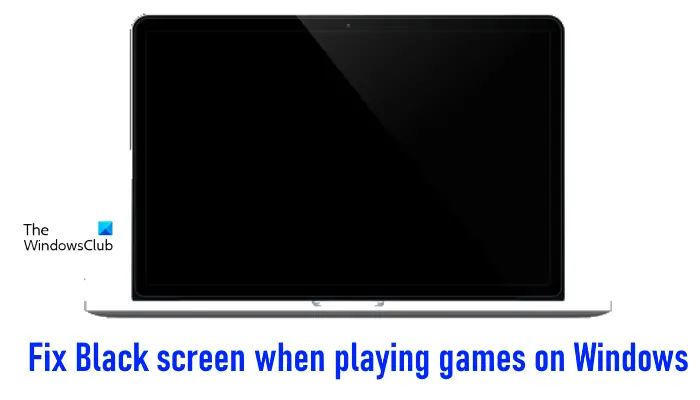
Fix Black Screen when playing games on Windows 11/10
If you see a black screen on launching or sometime after launching a game, here are some suggestions that are sure to help you fix the problem. But before you proceed, check if your system fulfills the hardware requirements for the game. Visit the official website of your game developer and check all the system requirements. If despite meeting the hardware requirements, you still experience a black screen issue on your PC, try the following solutions.
- Check the cable through which you have connected your monitor to your PC
- Roll Back your graphics card driver
- Update or reinstall your graphics card driver
- Check your PSU
- Check your graphics card
- Change your monitor’s response time setting
- Disable Game Mode
- Keep an eye on GPU temperature
- Run Hardware and Devices Troubleshooter
- Power cycle your Xbox console (solution for Xbox users)
- Switch to a high-performance power plan setting
- Disable Hardware Acceleration in Chrome or Firefox (if you are playing the game in Chrome or Firefox)
- Turn off ASCR on your monitor
- Run the game in compatibility mode
- Troubleshoot in a Clean Boot state
- Perform a System Restore
- Uninstall and reinstall the game
- Upgrade your system’s hardware
Below, we have explained all these fixes in detail.
1] Check the cable through which you have connected your monitor to your PC
You can connect a monitor to a PC via HDMI or VGA cable. Check if the issue is occurring in all the games. If yes, your HDMI or VGA cable might be damaged. Change your HDMI or VGA cable and then check if this fixes the problem. If changing the HDMI or VGA cable does not help, the problem is occurring due to some other causes. Move ahead and try the next fix.
2] Roll Back your graphics card driver

Microsoft recommends users keep their systems up to date. Installing the latest Windows Updates is essential for the system’s security. Apart from that, you will also get some additional features after installing the latest updates. When you install Windows Updates, your outdated device drivers are also updated automatically (if an update from the device driver manufacturer is released). If you are experiencing the issue after installing the latest Windows Update, rolling back your graphics card driver can fix the problem. An option to roll back the device drivers is available in the Device Manager.
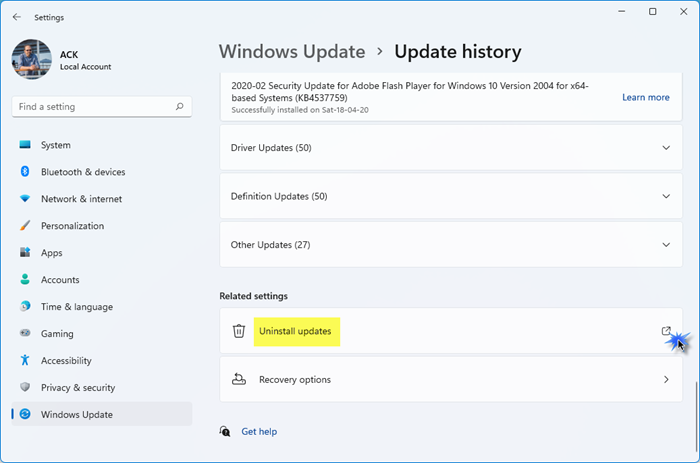
Open the Device Manager and see if the Roll Back option is available for your graphics card driver. If yes, click on it. If rolling back the driver does not fix the issue or if the Roll Back button is greyed out, uninstall the latest Windows Update.
3] Update or reinstall your graphics card driver
The most common cause of this problem is outdated or corrupted graphics card drivers. Open the Optional Updates page in your Windows 11/10 Settings and see if an update for your graphics card driver is available. If yes, install it. If after updating the graphics card driver, the issue still persists, download the latest version of your graphics card driver from the manufacturer’s website and install it manually.
Follow the steps below:
- Visit the manufacturer’s website and download the latest version of your graphics card driver.
- Open the Device Manager.
- Expand the Display Adapters branch.
- Right-click on your graphics card driver and select Uninstall device. Don’t worry, you will not lose your display after uninstalling the driver. Windows will use the default driver to display the content on your screen.
- Run the installer file to install the graphics card driver manually.
- Restart your computer.
4] Check your PSU
If the power delivered by your PSU (Power Supply Unit) to your graphics card is less than the power required by your graphics card to operate correctly, you will experience several issues while playing the games. One way to check this is to connect your graphics card with another PSU. If you have a gamer friend, you can ask him for his PSU to test your game. If there is no other PSU available, you can skip this troubleshooting method and try the other solutions provided in this article.
Read: Black Screen Troubleshooter will fix Blank screen errors
5] Check your graphics card
If the black screen issue is occurring in all the games installed on your computer, your graphics card may be damaged. To check this, disconnect your graphics card from your computer and play those games that are supported by your integrated graphics card. If the problem does not appear while playing the games from your integrated graphics card, the issue might be associated with your dedicated graphics card. Another thing that you can do is to connect your computer with your friend’s graphics card (if available) and see if the screen goes black while playing the games.
Before you make the decision to replace your graphics card, we recommend you try other fixes provided here and see if any of them help.
6] Change your monitor’s response time setting
According to some users, changing their monitor’s response time settings fixed the problem. There are three settings to change the monitor response time, low, medium, and high. Set your monitor response time to medium and see if it brings any changes.
7] Disable Game Mode
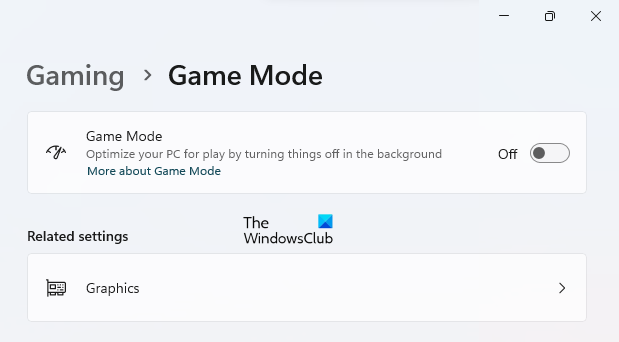
Some users have found that the issue started occurring after turning on the Game Mode. When they turned off the Game Mode, the issue disappeared. You can also try this. To turn off the Game Mode, open WIndows 11/10 Settings and go to “Gaming > Game Mode” and turn off the Game Mode.
8] Keep an eye on GPU temperature
When you play games, the load on your graphics card increases due to which its temperature also increases. Graphics cards require a sufficient amount of cooling to deliver the best performance. Hence, it is necessary that your fan is providing adequate cooling to the graphics card.
If the screen goes black after some time playing the game, keep an eye on your graphics card temperature. You can also use free software to monitor the temperature of your graphics card. If your fan is not providing enough cooling to your graphics card, increase the speed of your fan.
9] Run Hardware and Devices Troubleshooter
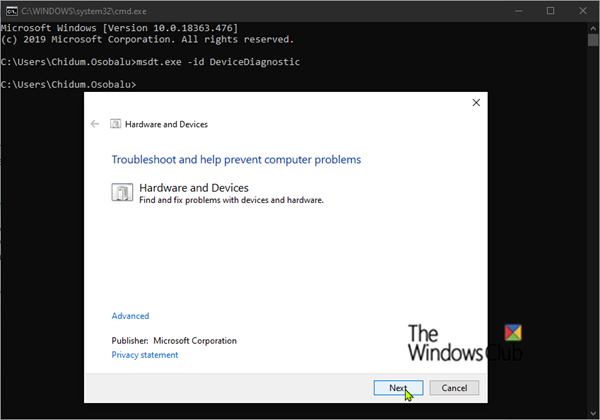
If there are any hardware-related issues that can be fixed on your end, running the Hardware and Devices Troubleshooter can help. Previously, this tool was accessible via the Windows 11/10 Settings app. Now, you have to run the following command in an elevated Command Prompt to launch it.
msdt.exe -id DeviceDiagnostic
10] Power cycle your Xbox console (solution for Xbox users)
If your display goes black while playing games via the Xbox Console, power cycle your Xbox Console and see if this fixes the problem. The following instructions will help you.
- Press and hold the Xbox button on your console until it turns off properly.
- Disconnect your Xbox Console from your computer.
- Disconnect the power cable.
- Wait for a few minutes. Connect the power cable.
- Connect Xbox Console to your computer and turn it on.
Now, check if the issue persists.
Read: Battlefield 2042 Black Screen on startup or while loading.
11] Switch to a high-performance power plan setting
Sometimes, the balanced power plan settings cause issues while playing the games. That’s why the high-performance power plan setting is always suggested for the best gaming performance. Create a new power plan on your laptop with the high-performance power plan setting.
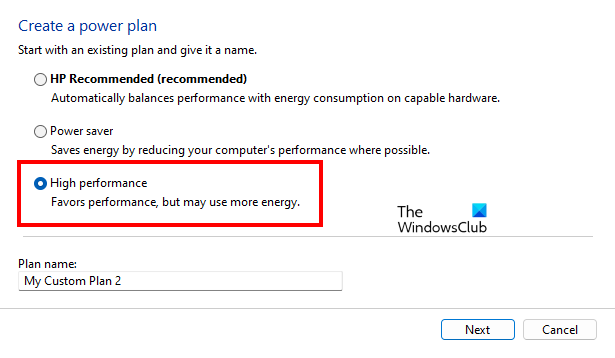
The steps for the same are as follows:
- Open the Control Panel.
- Make sure that Category is selected in the View by mode.
- Go to “Hardware and Sound > Power Options.”
- Select Create a Power Plan option from the left side.
- Select High performance and name your power plan.
- Click Next and then click Create.
If this fixes your problem, you can switch to the custom power plan while playing the games and switch back to the balanced power plan after playing the game.
12] Disable Hardware Acceleration in Chrome or Firefox (if you are playing the game in Chrome or Firefox)
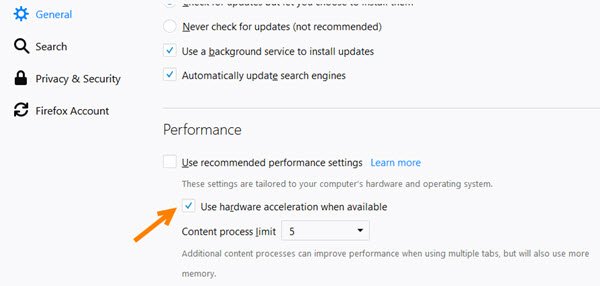
Today, a number of gaming platforms are available, like Steam, Origin, etc. You can open these gaming platforms in your web browsers to play games. Users do this usually when they experience issues in the apps of these gaming platforms. If you are experiencing the black screen problem while playing games in Chrome or Firefox, disabling the hardware acceleration in Chrome and Firefox can fix the issue.
13] Turn off ASCR on your monitor
This solution is for users who have ASUS monitors. ASCR stands for ASUS Smart Contrast Ratio. ASUS developed this technology to enhance the display dynamic contrast ratio up to 100,000,000:1, which adjusts the brightness according to the content. Some users have found this technology interfering with the games due to which their monitor screen goes black.
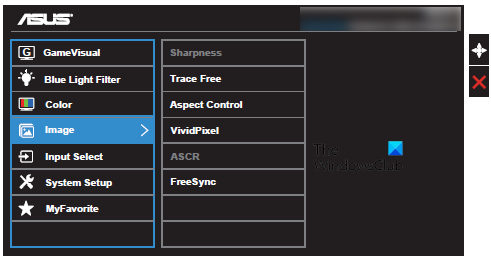
Turn ASCR off and see if it helps. To do so, follow the instructions provided below:
- Press the Menu key to enter the OSD menu.
- Go to “Image > ASCR.”
- Turn it off.
14] Run the game in compatibility mode
One more thing that you can try to fix the issue is to run the game in compatibility mode. See if the black screen appears while playing the game. The steps are as follows:
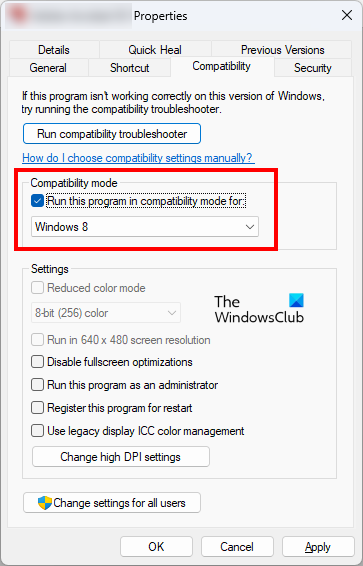
- Right-click on the shortcut of your game and select Properties.
- When the properties window appears, select the Compatibility tab.
- Under the Compatibility mode section, enable the “Run this program in compatibility mode for” checkbox.
- Select Windows 8 in the drop-down.
- Click Apply and then click OK.
If this fixes the problem, leave the compatibility mode setting enabled for your game.
Read: Fix Far Cry 6 Black Screen issues on Windows PC.
15] Troubleshoot in a Clean Boot state
There might be a third-party background application interfering with the game due to which you are encountering the black screen issue. To fix this problem, you have to start your computer in a Clean Boot state and then troubleshoot the problem.
After starting your computer in Clean Boot, launch your game and monitor it for some time to see if the black screen appears. If you are able to play the game without any interruption in the Clean Boot state, any of the background applications is the culprit. To identify it, enable some of the disabled programs in the Clean Boot and start your computer in a normal state. Now, check if the issue occurs. If the problem reappears in the normal mode, start disabling the applications one by one that you have just enabled and launch your game every time you disable an application. This process will take some time but you will be able to identify the problematic application. Once you find the culprit, uninstall it or check for its updated version on its official website.
16] Perform a System Restore
If you have created a System Restore point at the time when everything was working fine, you can take your system back to that state by using that System Restore point. Performing a System Restore should fix the issue, provided the hardware components of your system are working fine.
17] Uninstall and reinstall the game
If none of the above solutions worked, uninstall and reinstall the game you are experiencing the issue with. You can uninstall the game via Windows 11/10 Settings.
18] Upgrade your system’s hardware
The last step to fix the black screen problem when playing games on Windows 11/10 is to upgrade your system’s hardware. If your system has less RAM, say 4 GB, upgrading it to 8 GB or 16 GB can help. If the black screen appears on every game you play on your computer, the problem might be associated with your graphics card. Replace your graphics card in case you have an older graphics card.
Fix Black screen when opening games in full-screen mode
Experiencing a black screen during fullscreen gaming typically indicates hardware or software conflicts. Key culprits include outdated or corrupted graphics drivers, overheating of components, insufficient power supply, or conflicts with third-party software. Ensuring all drivers are up-to-date and monitoring system health can often resolve this issue.
Read: Fix Steam black screen or not loading on Windows PC.
Why does my computer screen keep going black when I play games?
A black screen while playing games may be an indication of a faulty graphics card. To confirm this, you can connect another graphics card to your computer (if available) and check if the problem persists. If another graphics card is not available, you can do one thing, disconnect the dedicated graphics card and run the games on your integrated graphics card (the games that are supported by your integrated graphics card). If the black screen does not appear, your graphics card may be faulty.
Another cause of the problem is the corrupted graphics card driver. Update your graphics card driver and see if this helps. If the problem started occurring after a certain Windows Update, roll back your graphics card driver (if the option is available) or uninstall the recent Windows Update.
Graphics card black screen while playing games on PC
If you receive a Black screen when switching to the dedicated graphics card while playing games, update your Graphics card driver and see. If it does not help, switch to the Integrated Graphics card and see.
How do I fix the black screen on Windows 11?
If there is only a cursor on the screen and the entire screen is black, try to bring up the Task Manager by pressing the Ctrl + Alt + Delete keys. Once the Task Manager appears, restart the Windows Explorer and see if it helps. If a recent Windows Update caused the black screen problem, reboot into Safe Mode and roll back the display driver. If the rollback option is greyed out, uninstall the display driver in the Safe Mode and restart your system in normal mode. After restart, Windows will automatically detect the hardware changes and install the latest version of your display driver.
Hope this helps.
Read next:
Leave a Reply